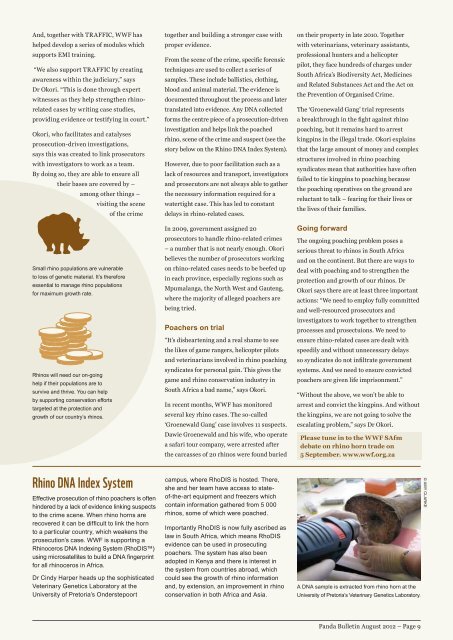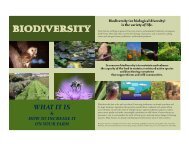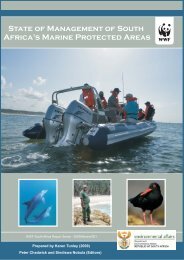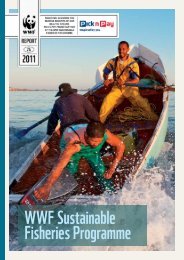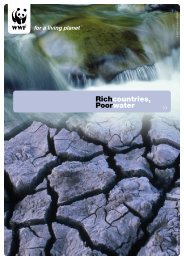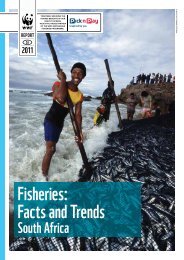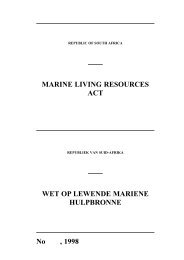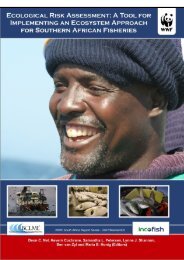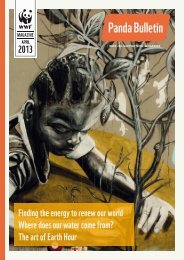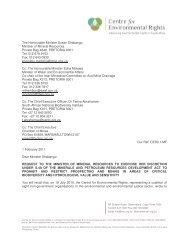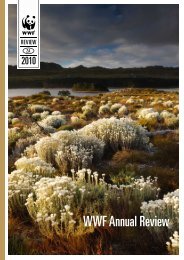Living Planet Report - WWF South Africa
Living Planet Report - WWF South Africa
Living Planet Report - WWF South Africa
Create successful ePaper yourself
Turn your PDF publications into a flip-book with our unique Google optimized e-Paper software.
And, together with TRAFFIC, <strong>WWF</strong> has<br />
helped develop a series of modules which<br />
supports EMI training.<br />
“We also support TRAFFIC by creating<br />
awareness within the judiciary,” says<br />
Dr Okori. “This is done through expert<br />
witnesses as they help strengthen rhinorelated<br />
cases by writing case studies,<br />
providing evidence or testifying in court.”<br />
Okori, who facilitates and catalyses<br />
prosecution-driven investigations,<br />
says this was created to link prosecutors<br />
with investigators to work as a team.<br />
By doing so, they are able to ensure all<br />
their bases are covered by –<br />
among other things –<br />
visiting the scene<br />
of the crime<br />
Small rhino populations are vulnerable<br />
to loss of genetic material. it’s therefore<br />
essential to manage rhino populations<br />
for maximum growth rate.<br />
rhinos will need our on-going<br />
help if their populations are to<br />
survive and thrive. you can help<br />
by supporting conservation efforts<br />
targeted at the protection and<br />
growth of our country’s rhinos.<br />
Rhino DNA Index System<br />
effective prosecution of rhino poachers is often<br />
hindered by a lack of evidence linking suspects<br />
to the crime scene. When rhino horns are<br />
recovered it can be difficult to link the horn<br />
to a particular country, which weakens the<br />
prosecution’s case. <strong>WWF</strong> is supporting a<br />
rhinoceros DNA indexing System (rhoDiS)<br />
using microsatellites to build a DNA fingerprint<br />
for all rhinoceros in <strong>Africa</strong>.<br />
Dr Cindy Harper heads up the sophisticated<br />
Veterinary Genetics laboratory at the<br />
university of Pretoria’s onderstepoort<br />
together and building a stronger case with<br />
proper evidence.<br />
From the scene of the crime, specific forensic<br />
techniques are used to collect a series of<br />
samples. These include ballistics, clothing,<br />
blood and animal material. The evidence is<br />
documented throughout the process and later<br />
translated into evidence. Any DNA collected<br />
forms the centre piece of a prosecution-driven<br />
investigation and helps link the poached<br />
rhino, scene of the crime and suspect (see the<br />
story below on the Rhino DNA Index System).<br />
However, due to poor facilitation such as a<br />
lack of resources and transport, investigators<br />
and prosecutors are not always able to gather<br />
the necessary information required for a<br />
watertight case. This has led to constant<br />
delays in rhino-related cases.<br />
In 2009, government assigned 20<br />
prosecutors to handle rhino-related crimes<br />
– a number that is not nearly enough. Okori<br />
believes the number of prosecutors working<br />
on rhino-related cases needs to be beefed up<br />
in each province, especially regions such as<br />
Mpumalanga, the North West and Gauteng,<br />
where the majority of alleged poachers are<br />
being tried.<br />
poachers on trial<br />
“It’s disheartening and a real shame to see<br />
the likes of game rangers, helicopter pilots<br />
and veterinarians involved in rhino poaching<br />
syndicates for personal gain. This gives the<br />
game and rhino conservation industry in<br />
<strong>South</strong> <strong>Africa</strong> a bad name,” says Okori.<br />
In recent months, <strong>WWF</strong> has monitored<br />
several key rhino cases. The so-called<br />
‘Groenewald Gang’ case involves 11 suspects.<br />
Dawie Groenewald and his wife, who operate<br />
a safari tour company, were arrested after<br />
the carcasses of 20 rhinos were found buried<br />
campus, where rhoDiS is hosted. There,<br />
she and her team have access to stateof-the-art<br />
equipment and freezers which<br />
contain information gathered from 5 000<br />
rhinos, some of which were poached.<br />
importantly rhoDiS is now fully ascribed as<br />
law in <strong>South</strong> <strong>Africa</strong>, which means rhoDiS<br />
evidence can be used in prosecuting<br />
poachers. The system has also been<br />
adopted in kenya and there is interest in<br />
the system from countries abroad, which<br />
could see the growth of rhino information<br />
and, by extension, an improvement in rhino<br />
conservation in both <strong>Africa</strong> and Asia.<br />
on their property in late 2010. Together<br />
with veterinarians, veterinary assistants,<br />
professional hunters and a helicopter<br />
pilot, they face hundreds of charges under<br />
<strong>South</strong> <strong>Africa</strong>’s Biodiversity Act, Medicines<br />
and Related Substances Act and the Act on<br />
the Prevention of Organised Crime.<br />
The ‘Groenewald Gang’ trial represents<br />
a breakthrough in the fight against rhino<br />
poaching, but it remains hard to arrest<br />
kingpins in the illegal trade. Okori explains<br />
that the large amount of money and complex<br />
structures involved in rhino poaching<br />
syndicates mean that authorities have often<br />
failed to tie kingpins to poaching because<br />
the poaching operatives on the ground are<br />
reluctant to talk – fearing for their lives or<br />
the lives of their families.<br />
going forward<br />
The ongoing poaching problem poses a<br />
serious threat to rhinos in <strong>South</strong> <strong>Africa</strong><br />
and on the continent. But there are ways to<br />
deal with poaching and to strengthen the<br />
protection and growth of our rhinos. Dr<br />
Okori says there are at least three important<br />
actions: “We need to employ fully committed<br />
and well-resourced prosecutors and<br />
investigators to work together to strengthen<br />
processes and prosectuions. We need to<br />
ensure rhino-related cases are dealt with<br />
speedily and without unnecessary delays<br />
so syndicates do not infiltrate government<br />
systems. And we need to ensure convicted<br />
poachers are given life imprisonment.”<br />
“Without the above, we won’t be able to<br />
arrest and convict the kingpins. And without<br />
the kingpins, we are not going to solve the<br />
escalating problem,” says Dr Okori.<br />
Please tune in to the <strong>WWF</strong> SAfm<br />
debate on rhino horn trade on<br />
5 September. www.wwf.org.za<br />
A DNA sample is extracted from rhino horn at the<br />
university of Pretoria’s Veterinary Genetics laboratory.<br />
Panda Bulletin August 2012 – Page 9<br />
© AMy ClArke


